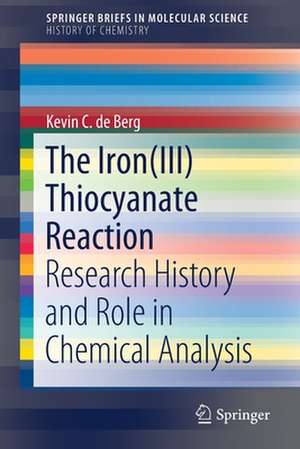The Iron(III) Thiocyanate Reaction: Research History and Role in Chemical Analysis: SpringerBriefs in Molecular Science
Autor Kevin C. de Bergen Limba Engleză Paperback – 27 noi 2019
Din seria SpringerBriefs in Molecular Science
-
 Preț: 411.46 lei
Preț: 411.46 lei -
 Preț: 379.09 lei
Preț: 379.09 lei -
 Preț: 356.49 lei
Preț: 356.49 lei -
 Preț: 441.25 lei
Preț: 441.25 lei -
 Preț: 389.70 lei
Preț: 389.70 lei -
 Preț: 376.22 lei
Preț: 376.22 lei -
 Preț: 348.77 lei
Preț: 348.77 lei -
 Preț: 345.14 lei
Preț: 345.14 lei -
 Preț: 347.69 lei
Preț: 347.69 lei -
 Preț: 346.70 lei
Preț: 346.70 lei -
 Preț: 376.43 lei
Preț: 376.43 lei -
 Preț: 342.14 lei
Preț: 342.14 lei -
 Preț: 375.23 lei
Preț: 375.23 lei -
 Preț: 375.23 lei
Preț: 375.23 lei -
 Preț: 379.09 lei
Preț: 379.09 lei -
 Preț: 376.59 lei
Preț: 376.59 lei - 15%
 Preț: 461.73 lei
Preț: 461.73 lei -
 Preț: 378.12 lei
Preț: 378.12 lei -
 Preț: 376.59 lei
Preț: 376.59 lei -
 Preț: 376.59 lei
Preț: 376.59 lei -
 Preț: 375.23 lei
Preț: 375.23 lei -
 Preț: 351.18 lei
Preț: 351.18 lei -
 Preț: 377.73 lei
Preț: 377.73 lei -
 Preț: 372.73 lei
Preț: 372.73 lei -
 Preț: 378.54 lei
Preț: 378.54 lei -
 Preț: 376.96 lei
Preț: 376.96 lei -
 Preț: 377.35 lei
Preț: 377.35 lei -
 Preț: 378.12 lei
Preț: 378.12 lei -
 Preț: 376.04 lei
Preț: 376.04 lei -
 Preț: 346.59 lei
Preț: 346.59 lei -
 Preț: 375.45 lei
Preț: 375.45 lei -
 Preț: 377.73 lei
Preț: 377.73 lei -
 Preț: 381.00 lei
Preț: 381.00 lei -
 Preț: 377.18 lei
Preț: 377.18 lei -
 Preț: 376.96 lei
Preț: 376.96 lei -
 Preț: 380.07 lei
Preț: 380.07 lei -
 Preț: 376.22 lei
Preț: 376.22 lei -
 Preț: 343.72 lei
Preț: 343.72 lei -
 Preț: 376.22 lei
Preț: 376.22 lei -
 Preț: 377.35 lei
Preț: 377.35 lei -
 Preț: 343.72 lei
Preț: 343.72 lei -
 Preț: 376.22 lei
Preț: 376.22 lei -
 Preț: 375.07 lei
Preț: 375.07 lei -
 Preț: 374.85 lei
Preț: 374.85 lei - 15%
 Preț: 464.97 lei
Preț: 464.97 lei -
 Preț: 376.43 lei
Preț: 376.43 lei -
 Preț: 341.75 lei
Preț: 341.75 lei -
 Preț: 374.30 lei
Preț: 374.30 lei -
 Preț: 375.23 lei
Preț: 375.23 lei -
 Preț: 377.57 lei
Preț: 377.57 lei
Preț: 377.57 lei
Nou
Puncte Express: 566
Preț estimativ în valută:
72.24€ • 75.44$ • 59.66£
72.24€ • 75.44$ • 59.66£
Carte tipărită la comandă
Livrare economică 15-29 aprilie
Preluare comenzi: 021 569.72.76
Specificații
ISBN-13: 9783030273156
ISBN-10: 3030273156
Pagini: 99
Ilustrații: XI, 99 p. 24 illus., 21 illus. in color.
Dimensiuni: 155 x 235 mm
Greutate: 0.17 kg
Ediția:1st ed. 2019
Editura: Springer International Publishing
Colecția Springer
Seriile SpringerBriefs in Molecular Science, History of Chemistry
Locul publicării:Cham, Switzerland
ISBN-10: 3030273156
Pagini: 99
Ilustrații: XI, 99 p. 24 illus., 21 illus. in color.
Dimensiuni: 155 x 235 mm
Greutate: 0.17 kg
Ediția:1st ed. 2019
Editura: Springer International Publishing
Colecția Springer
Seriile SpringerBriefs in Molecular Science, History of Chemistry
Locul publicării:Cham, Switzerland
Cuprins
Introduction.- The Reaction and Chemical Analysis.- The Reaction and its Nomenclature, Formulae, and Units.- The Reaction: Chemical Affinity and Controversy.- The Reaction: Chemical Affinity: Laws, Theories and Models.- The Reaction and its Equilibrium Constants: The Role of Mathematics and Data Analysis.- The Reaction and its Kinetics.- The Reaction in Secondary and Tertiary Education Curricula.- Conclusions.
Notă biografică
Kevin C. de Berg completed his PhD in physical chemistry in 1978 at the University of Queensland and his MAppSc in 1989 from Curtin University. His research thesis for the MAppSc degree examined the historical significance of the gas laws particularly for the education context. Interests in chemistry and history and philosophy of science led to an invitation to serve on the editorial committee of the journal: Science & Education-Contributions from History, Philosophy, and Sociology of Science and Mathematics; and to contributing a chapter titled: The Place of the History of Chemistry in the Teaching and Learning of Chemistry. Kevin has spent 9 years as a high school science and mathematics teacher and 36 years lecturing and researching in the area of physical and inorganic chemistry and history and philosophy of science. He is currently a Conjoint Associate Professor at Avondale College of Higher Education.
Textul de pe ultima copertă
This Brief presents an historical investigation into the reaction between ferric ions and thiocyanate ions, which has been viewed in different ways throughout the last two centuries. Historically, the reaction was used in chemical analysis and to highlight the nature of chemical reactions, the laws of chemistry, models and theories of chemistry, chemical nomenclature, mathematics and data analysis, and instrumentation, which are important ingredients of what one might call the nature of chemistry. Using the history of the iron(III) thiocyanate reaction as a basis, the book’s main objective is to explore how chemistry develops its own knowledge base; how it assesses the reliability of that base; and how some important tools of the trade have been brought to bear on a chemical reaction to achieve understanding, a worthwhile goal of any historical investigation.
Caracteristici
Sheds light on the role of the iron(III) thiocyanate reaction in the study of chemical equilibrium Provides an excellent example of how chemistry has developed its own knowledge base throughout history Discusses the controversies throughout its 180-year history
